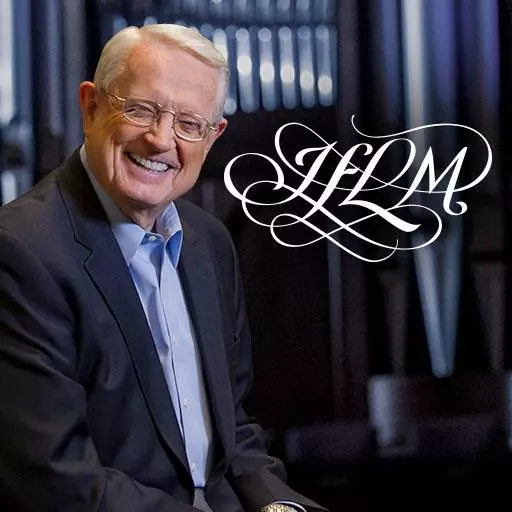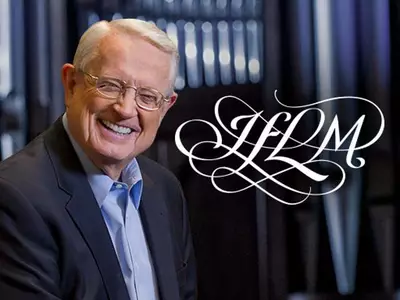Speaker 1
The virtue of gentleness is often viewed as a feminine trait. Tenderness is best expressed by women, but that's not consistent with the biblical definition.
Today on Insight for Living, Chuck Swindoll continues his topical series on the fruit of the Spirit. In this study, we're conducting a deep dive into a commonly disregarded virtue.
To help us understand this particular fruit of the Spirit, Chuck points to the compassion of a very powerful man and the tender mercy he extended to a family in need. Chuck titled today's message "Extending Grace Ever so Gently."
Speaker 2
We find a list of the fruit of the Spirit. In the book of Galatians, chapter 5, verses 22 and 23, Paul writes that the fruit of the Spirit is love, joy, peace, patience, kindness, goodness, faithfulness, gentleness, and self-control. We're working our way through the list, and we've gone through seven of them. Last time was faithfulness, you may recall, and today is gentleness, one of the great words in the Scriptures, gentle or meek.
Gentleness is revealed in an old story I have found in 2nd Samuel, chapter 9. If you have your Bible with you, locate that chapter, please. Only a few verses tucked away in the Old Testament, but it contains a marvelous account of King David as he showed gentleness and great grace. Just a touch of grace to a man who was disabled, never expecting such an act of kindness. Those are often the best.
2nd Samuel 9. I'll be reading from the New Living Translation. You follow along in the version that you use. One day David asked, "Is anyone in Saul's family still alive? Anyone to whom I can show kindness for Jonathan's sake?" He summoned a man named Ziba, who had been one of Saul's servants.
"Are you Ziba?" the king asked.
"Yes, sir, I am," Ziba replied.
The king then asked him, "Is anyone still alive from Saul's family? If so, I want to show God's kindness to them."
Ziba replied, "Yes, one of Jonathan's sons is still alive. He's crippled in both feet."
"Where is he?" the king asked.
"In Lo Debar," Ziba told him. "At the home of Machir, son of Ammiel."
So David sent for him and brought him from Machir's home. His name was Mephibosheth. He was Jonathan's son, Saul's grandson. When he came to David, he bowed low to the ground in deep respect.
David said, "Greetings, Mephibosheth."
Mephibosheth replied, "I am your servant."
"Don't be afraid," David said. "I intend to show kindness to you because of my promise to your father, Jonathan. I will give you all the property that once belonged to your grandfather Saul. And you will eat here with me at the king's table."
Mephibosheth bowed respectfully and exclaimed, "Who is your servant that you should show such kindness to a dead dog like me?"
Verse 12: Mephibosheth had a young son named Micah. From then on, all the members of Ziba's household were Mephibosheth's servants. And Mephibosheth, who was crippled in both feet, lived in Jerusalem and ate regularly at the king's table.
Speaker 1
You're listening to Insight for Living.
Did you know about the spiral bound workbooks for our Searching the Scriptures Bible studies? These workbooks are designed to help you dig deeper into the fruit of the Spirit. You can purchase a workbook today by going to insight.org/workbooks.
And now, here’s the message from Chuck called "Extending Grace Ever So."
Speaker 2
Gently when we need relief. We long for that touch of grace, especially when it is given with gentleness. And especially so when the one providing such gentleness has authority and is a powerful person. I remember as a little boy encountering just the opposite. I forget. I was about 10 or 11 years old, and I was struggling with a bellyache that wouldn't go away. I was doubled over in pain. My folks tried all the home remedies, and nothing worked. Finally, they realized that they needed to talk to a physician about their son. And so we went, my mother and I, and we walked into this office, which was immediately intimidating. There's just something about a doctor's office that's intimidating to a child, to a child, nothing to everybody.
As I was in there, I noticed that my mother stayed in the waiting room, said a few words to the doctor, and then he showed me into his office. Whoo. The walls were covered with official-looking diplomas and degrees and honors and awards and all kinds of things. Then he began to poke around and punch and push, and he handled me sort of like you'd handle a spare tire, as I recall. I mean, he never smiled. He never really looked me in the eye, honestly, never said a word to me. He was examining me for something, and I was in such pain. He turned me over and kept probing and pushing. Finally, he called my mother in, and she came in. He used a big word that started with the letter A I'd never heard of, and he said if we don't do something soon, poison could spread over his body. And I'm thinking, oh, man, it's bad enough to be in here. Now I've got poison running all over my body. I realized later it was appendicitis, and if the appendix burst, it could spread that into my abdomen. None of that was really explained to me. He talked to her about it, and the next thing I knew, the following day I was in surgery.
The thing I feared the most was his post-op exams. There he was again, pushing and probing and grim and silent and rough as a cob. All the way through, he was a good doc. He just didn't have any bedside manners and certainly didn't know how to treat a child. Somewhere along the way on his journey toward greatness, he and gentleness never met one another. He knew nothing of gentleness. He cared nothing about gentleness. As a result, no matter how successful the man may have been, to me he was anything but a kind doctor.
The word used in the Scriptures for gentleness is a beautiful term. It's "pro taste." It's from the Greek word "pros," which is most often translated meek in the Scriptures. Matthew 5:5. Early on in the Sermon on the Mount, Jesus refers to those who are meek as the ones who will inherit the earth. He's the one who says in Matthew 11:29, "Come to me, all who are weak and overburdened, and I will give you rest because I am." There's the word again, meek. He adds, gentle, humble of heart. "My yoke is easy, my burden is light." Those words are designed to welcome us in, to tell us that he will look at us, talk to us, hold us close, and treat us with gentleness and grace.
I found it interesting that even though in our English language meek sounds sort of weak and wimpish, almost passive, it does not mean that at all. In the original text, it has in mind a beast that has been tamed, still strong as steel, but now under control, now obedient. Immediately, I thought of a wild horse that is broken by a rider who knows horses and knows how to ride one, until finally the will is brought into submission. That horse, still strong as steel, weighing much more and much larger than the rider himself, is now controlled by straps of leather and a bridle in the mouth. It's strength under control; that's gentleness.
We have a wonderful saying in our world today as we meet up with people who are large of stature but soft-spoken and gracious. We call them gentle giants, and so they are larger than we are, but they have a touch of grace about them. They care, they listen, they treat you with respect. They're gentle. I've just described David, and there was a reason. There was a reason he was like that. If you go back and with an open mind and a fresh look into the Scriptures, the first time you meet David, he's virtually apart from his family. He has a number of brothers who were paraded before Samuel, who's come to the home of Jesse in Bethlehem, perhaps to find the next king whom he would anoint. He brought the oil with him, and Jesse paraded all of his sons in front of Samuel, and none of them was the Lord's choice. Samuel says, "Are these all your sons?" because he knew he had been led to the home of the Lord. But these sons were not the ones to be anointed. Jesse responds, "Oh, yes, I have one more. He keeps the sheep."
Did you hear that? One of the sons is out there. Why don't you wonder? If you weren't really wanted as a child, you'd be very curious about that scene where Jesse whistles and gets David's attention in the field and has him come in almost as an afterthought. He says to Samuel, "Here's our youngest." Samuel says, "This is the Lord's anointed." Now, David has never read 1st Samuel 16, so he doesn't know what's happening. It's all news to him. The next thing he knows, he has oil running down the back of his neck and words about the next king. He's the most surprised one in the room. "Me?" he thinks. I have the feeling David wasn't treated well by the brothers or even by the father as he grew up.
There's a Psalm, Psalm 51. Check it for yourself. I think it's around verse 5. In sin my mother conceived me, writes David, and I too am sinful. Now, wait. I realize theologically it's saying my mother was a sinner and she gave birth to me, and I too am sinful. I wonder if it means more. I wonder if the act of conception was a sinful act and David was born out of wedlock. I've never heard anyone teach that. But I wonder, why else would David be separated from his brothers and relegated to the role of a little shepherd boy? Why wasn't he brought in immediately when Jesse heard that there was a man coming to anoint the next king? I want all my sons in here, but not, not, not him.
There's a beautiful ending to a Michael psalm, Psalm number 78. The last three verses, 70 through 72, where we read, "God chose David, also his servant, and took him from the sheepfolds." I love this. "He took him from the sheepfolds, from following the ewes with suckling lambs. He brought him to feed Jacob his people and Israel his inheritance. So he fed them according to the integrity of his heart, and he guided them with skillful hand." The next time you have a little time, ponder the last couple of verses of Psalm 78. It's beautiful. Integrity of heart, skillfulness of hands. That's David.
That's why when, after killing the giant, Saul calls him in and says, "Who are you? Who are you?" That comes at this giant with a sling and a stone. We read that David is talking to Saul, the king who wasn't man enough to face the giant. It says David still has Goliath's head in his hand. I've often thought, well, that's a great picture, all that stuff hanging down underneath Goliath's head. He's standing there talking to Saul, blood all over the floor. He says, "Oh, well, I'm the son of Jesse, and we live in Bethlehem." How humble can you get? He just killed a giant. He doesn't look for honors. He's not going downtown to look for crowns to be fitted as the next king. In fact, if you track the story, he's back with his father's sheep before you know it.
Now, the reason I take your time to set that stage is because it explains why David has such a heart for a forgotten man. In this case, a man named Mephibosheth. His name looks like a misprint. I mean, who could even spell it? David has reached the zenith of power. He is the king of Israel, top of the heap. He's sitting in the palace, musing, pondering the goodness of God in his life. He remembers something. His predecessor, Saul, and his best friend, Jonathan, had both been killed on Mount Gilboa in the same battle. He's grieved their loss, and now he remembers. I made a promise. I promised Saul I would never cut off his family. I promised Jonathan I would never forget him or his family. Where are his family members?
Understand this. In those days, the days of the kings, when a new monarchy became the new dynasty, all those in the old dynasty were exterminated. If not exterminated, they were driven out. Get out. The new king is now in authority. David never drove them out. That was the cultural tradition. And get this. Mephibosheth is the grandson of Saul the king, the son of Jonathan, David's best friend. He's just a little boy. His nanny picks him up in her arms, knowing that both her life and his are hanging in the balance with this new dynasty. The Davidic kingdom has arrived. She runs to escape, and she stumbles and falls. His feet are broken and never, never brought to anyone who can repair them and fix them. So he's living now as a disabled young adult.
David knows nothing of that. He's now come to the throne. Mephibosheth, in hiding in the little cabin owned by another, knows nothing of David's thinking. The thing he fears the most is being found. So he lives in this anonymity, this obscurity, in a place that is revealed in the scriptures as Lo Debar. In the Hebrew language, "lo" means no. "Debar" is the word for pasture or pastureland. It was a place of unimaginable desolation, of course. A place the new king would never go looking for someone if he was trying to mop up the old dynasty and wipe it out. He's in hiding, hoping never to be found.
David, alone with his thoughts, calls in anyone from the family of Saul. He meets Ziba, Saul's servant, and he says to him, "Is there anyone to whom I can show kindness for Jonathan's sake?" Interesting word translated kindness. It's the Hebrew term "chesed." You haven't said it right if something doesn't land on the neck of the person in front of you; it's a guttural word. "Chesed." It means. That's a beautiful word. It means loving kindness. It means grace. "Is there anyone? Ziba, is there anyone? Do you know of anybody from your master's family that may still be alive?" Ziba ponders the thought for a moment, and he says, "Well, there is one. But King David, he's crippled. Both feet, he's disabled."
David hadn't asked what condition he was in. David simply asked, "Is there anyone?" That's what grace asks. "Is there anyone?"
Speaker 1
Well, keep listening because there's much more to this touching human story that Chuck Swindoll wants to share with you. He titled today's message "Extending Grace Ever So Gently." We're in the final stretch of this brand new topical study on the fruit of the Spirit that concludes on Friday.
Here at Insight for Living, we understand you can't be here every single day. So if you missed any portion of this nine-part series, you can easily listen to the entire study by downloading our convenient mobile app. Or if you prefer to own a tangible copy of Chuck's series, you can purchase all nine studies on audio CD—just call us at 800-772-8888.
To complement this series, our creative team at Insight for Living has put together a spiral-bound Bible study workbook for you. This resource on the fruit of the Spirit is part of our Searching the Scriptures Bible Studies. The workbook is for listeners who want to fully engage in a personal study through all nine virtues that Paul identifies in Galatians Chapter Five. You can order a copy right now by going to insight.org/workbooks.
Insight for Living Ministries is financially sustained by grateful listeners just like you, and today we'd like to thank anyone who gives a contribution by sending them a brand new booklet written by Chuck. It's called "How to Follow a Giant." Sometimes we wonder about the next generation and whether they'll embrace the faith that we hold dear. Well, in this booklet, Chuck describes how to pass on wisdom to young leaders and how to honor the mentors who have gone before us.
Ask for the booklet called "How to Follow a Giant" when you give a donation sent to this address: Insight for Living, Post Office Box 5000, Frisco, Texas 75034. That's Post Office Box 5000, Frisco, TX 75034. You can also call us at 800-772-8888 or give online at insight.org.
I'm Bill Maier. Join us when Chuck Swindoll continues his message called "Extending Grace Ever So Gently" tomorrow on Insight for Living.
The preceding message, "Extending Grace Ever So Gently," was copyrighted in 2023 and 2024, and the sound recording was copyrighted in 2024 by Charles R. Swindoll, Inc. All rights are reserved worldwide. Duplication of copyrighted material for commercial use is strictly prohibited.

 Learn How
Learn How







